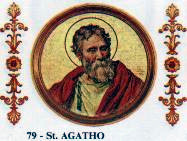
Pope Agatho served as the Pope from 27 June 678 until his death in 681. He heard the appeal of Wilfrid of York, who had been displaced from his See by the division of the Archdiocese ordered by Theodore of Canterbury. During Agatho's tenure, the Sixth Ecumenical Council was convened which dealt with the monothelitism controversy. He is venerated as a saint by both the Catholic and Eastern Orthodox Churches.
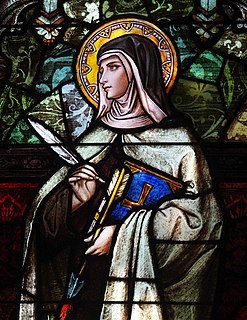
A saint is a person who is recognized as having an exceptional degree of holiness or likeness or closeness to God. However, the use of the term "saint" depends on the context and denomination. In Roman Catholic, Eastern Orthodox, Anglican, Oriental Orthodox, and Lutheran doctrine, all of their faithful deceased in Heaven are considered to be saints, but some are considered worthy of greater honor or emulation; official ecclesiastical recognition, and consequently veneration, is given to some saints through the process of canonization in the Catholic Church or glorification in the Eastern Orthodox Church.

Pope Clement I, also known as Saint Clement of Rome, is listed by Irenaeus and Tertullian as Bishop of Rome, holding office from 88 to his death in 99. He is considered to be the first Apostolic Father of the Church, one of the three chief ones together with Polycarp and Ignatius of Antioch.

The highest-ranking bishops in Eastern Orthodoxy, Oriental Orthodoxy, the Catholic Church, and the Church of the East are termed patriarchs.

The Syriac Orthodox Church of Antioch, or Syriac Orthodox Patriarchate of Antioch and All the East, is an Oriental Orthodox Church with autocephalous patriarchate established by Severus of Antioch in Antioch in 37 AD, tracing its founding to Antioch by Saint Peter and Saint Paul in the 1st century, according to its tradition. The Church uses the Divine Liturgy of Saint James, associated with St. James, the "brother" of Jesus and patriarch among the Jewish Christians at Jerusalem. Syriac is the official and liturgical language of the Church based on Syriac Christianity. The primate of the church is the Syriac Orthodox Patriarch of Antioch currently Ignatius Aphrem II since 2014, seated in Cathedral of Saint George, Bab Tuma, Damascus, Syria.
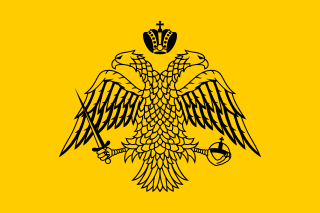
The name Greek Orthodox Church, or Greek Orthodoxy, is a term referring to the body of several Churches within the larger communion of Eastern Orthodox Christianity, whose liturgy is or was traditionally conducted in Koine Greek, the original language of the Septuagint and the New Testament, and whose history, traditions, and theology are rooted in the early Church Fathers and the culture of the Byzantine Empire. Greek Orthodox Christianity has also traditionally placed heavy emphasis and awarded high prestige to traditions of Eastern Orthodox monasticism and asceticism, with origins in Early Christianity in the Near East and in Byzantine Anatolia.
Patriarch of Antioch is a traditional title held by the Bishop of Antioch As the traditional "overseer" of the first gentile Christian community, the position has been of prime importance in the church from its earliest period. This diocese is one of the few for which the names of its bishops from the apostolic beginnings have been preserved. Today five churches use the title of Patriarch of Antioch: the Syriac Orthodox Church, the Greek Orthodox Church of Antioch, the Syriac Catholic Church, the Melkite Greek Catholic Church, and the Maronite Church. Historically, there has also been a Latin Patriarch of Antioch.

Doctor of the Church is a title given by the Catholic Church to saints recognized as having made significant contribution to theology or doctrine through their research, study, or writing.
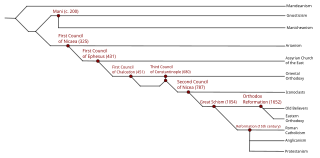
A Christian denomination is a distinct religious body within Christianity, identified by traits such as a name, organization, leadership and doctrine. Individual bodies, however, may use alternative terms to describe themselves, such as church or sometimes fellowship. Divisions between one group and another are defined by authority and doctrine; issues such as the nature of Jesus, the authority of apostolic succession, eschatology, and papal primacy may separate one denomination from another. Groups of denominations—often sharing broadly similar beliefs, practices, and historical ties—are sometimes known as "branches of Christianity". These branches differ in many ways, especially through differences in practices and belief.

The Liturgy of Saint James or Jacobite Liturgy is the oldest complete form of the Eastern varieties of the Christian liturgy still in use among certain Christian Churches.
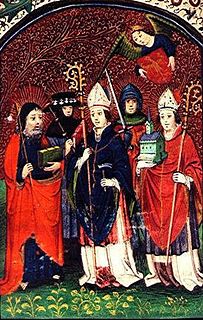
Christianity has used symbolism from its very beginnings. Each saint has a story and a reason why they led an exemplary life. Symbols have been used to tell these stories throughout the history of the Church. A number of Christian saints are traditionally represented by a symbol or iconic motif associated with their life, termed an attribute or emblem, in order to identify them. The study of these forms part of iconography in art history. They were particularly used so that the illiterate could recognize a scene, and to give each of the Saints something of a personality in art. They are often carried in the hand by the Saint.

The Feast of Orthodoxy is celebrated on the first Sunday of Great Lent in the liturgical calendar of the Eastern Orthodox Church and of the Byzantine Rite Eastern Catholic Churches. The Feast is kept in memory of the final defeat of iconoclasm and the restoration of the icons to the churches.
The Church of Alexandria in Egypt is the Christian Church headed by the Patriarch of Alexandria. It is one of the original Apostolic Sees of Christianity, alongside Rome, Antioch, Constantinople and Jerusalem.

Achaicus was a Corinthian Christian who according to the Bible, together with Fortunatus and Stephanas, carried a letter from the Corinthians to St. Paul, and from St. Paul to the Corinthians.

The Jacobite Syrian Christian Church also known as the Malankara Jacobite Syrian Christian Church, the Malankara Jacobite Syrian Orthodox Church, or the Syriac Orthodox Church of India, is an autonomous Oriental Orthodox Church based in the Indian state of Kerala, and is an integral branch of the Syriac Orthodox Church of Antioch. It recognizes the Syriac Orthodox Patriarch Of Antioch and all the East, currently Moran Mor Ignatius Aphrem II seated in the Cathedral of Saint George, Bab Tuma, Damascus, Syria, as its Supreme Head. It functions as a largely autonomous unit within the church, under the authority of the Catholicos of India, currently Aboon Mor Baselios Thomas I. Currently, this is the only church in Malankara which has a direct relationship with the Syriac Christians of Antioch, which has continued from after the schism and they continue to use West Syriac Rite.
The title Confessor, the short form of Confessor of the Faith, is a title given by the Christian Church to a type of saint.

The Church Fathers, Early Church Fathers, Christian Fathers, or Fathers of the Church were ancient and influential Christian theologians and writers. There is no definitive list. The era of these scholars who set the theological and scholarly foundations of Christianity largely ended by AD 700.













